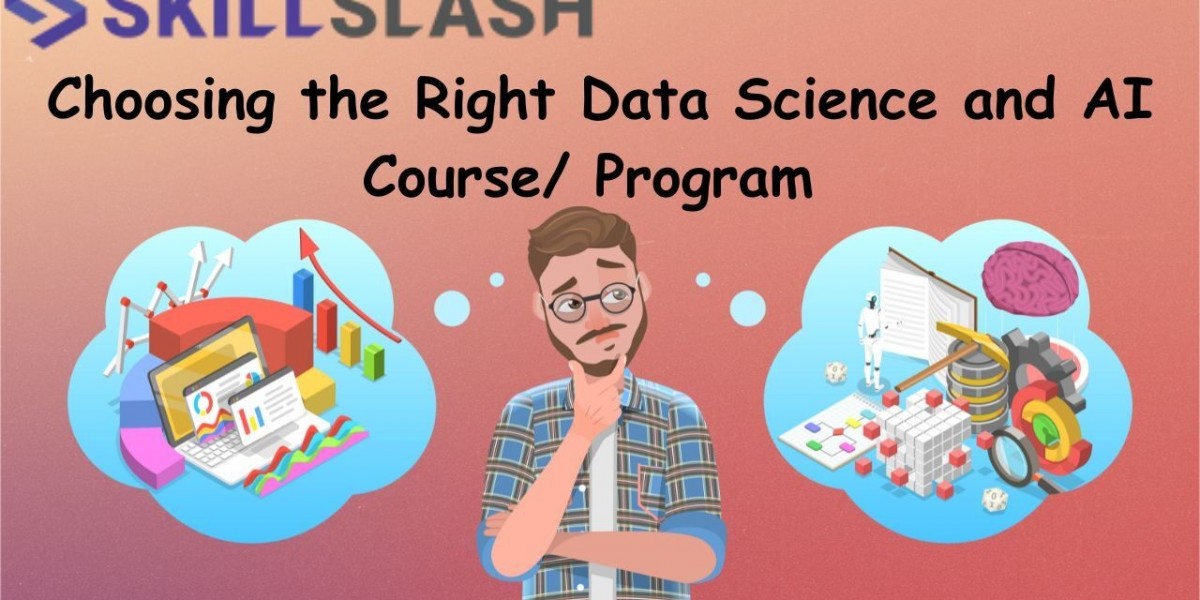Selecting a Data Science and Artificial Intelligence (D&I) course, whether offered by an academic institution or through an online platform, is a critical decision that can significantly influence your future career. This guide will provide you with the necessary information to make an educated decision.
Here, we will proceed to cover a variety of topics, including program types, requirements, accreditations, curricula, delivery model, pricing, and career opportunities: -
Define Your Goals and Objectives
Before diving into the world of data science and artificial intelligence courses, it is important to establish a clear understanding of your objectives and goals in pursuing a program in this field.
Ask yourself the following questions:
Are you looking to pursue a career in data science and artificial intelligence (AI)?
Are you interested in a particular field of study, such as machine learning, NLP, or computer vision? If so, what level of expertise would you like to develop towards (beginner, intermediate, or advanced)?
Do you wish to pursue a degree or an optional certificate program?
Are you looking to diversify your career or enhance your skills?
How much money and time are you willing to invest?
Research Program Types
There are different types of data science and Artificial intelligence (AI) programs out there, and it’s important to know the distinctions between them, which are highlighted below:
University Programs:
Bachelor’s Degree: If you are just starting out from scratch, you may want to consider pursuing a Bachelor’s degree in computer science or a related field of study. Many universities offer Bachelor’s degree programs in data science or artificial intelligence.
Master’s Degree: A master’s degree in data science, machine learning, or artificial intelligence (AI) is one of the most sought-after degrees for those seeking advanced knowledge and skills. Typically, a bachelor’s degree in a related field is required as a requirement.
Ph.D. Program: If you wish to pursue a career in research or academia, you may wish to consider enrolling in a doctoral degree program in a field of study that is of particular interest to you. These doctoral programs are characterized by their specialized nature and the intensive nature of their research.
Online Programs
MOOCs (Massive Open Online Courses): Online data science and artificial intelligence courses are available on platforms like Coursera and edX, as well as Udacity. They cover a variety of topics related to data science and Artificial Intelligence, and are designed to be flexible and self-paced.
Online Master’s Programs: Many colleges and universities offer online bachelor’s and master’s degrees in the fields of data science and artificial intelligence. These programs are usually more flexible than those offered on campus.
Bootcamps: Bootcamps in the field of data science are short-term intensive programs that focus on developing practical skills. These programs are suitable for individuals who are looking to advance their career or those who are looking to upgrade their skills in a short period of time.
3. Check Prerequisites
It is important to ensure that you possess the necessary qualifications for the program you are interested in. These qualifications may include a certain level of education (e.g. a bachelor’s degree in a relevant field), programming proficiency (i.e., Python), and mathematical proficiency (e.g.: Calculus, Linear Algebra, Statistics)
4. Accreditation
If you’re thinking about pursuing a degree, you’ll want to make sure that the institution and program you’re considering are accredited. By accrediting a program, you’re ensuring that it meets certain quality criteria and that employers will recognize your degree.
5. Curriculum
Thoroughly check what each program has to offer to make sure it’s the right fit for you. Here’s what you should look for:
Core courses: Courses in statistics, machine learning, data visualization, and AI fundamentals.
Electives: Options to specialize in areas of interest (e.g., deep learning, natural language processing).
Projects and Capstone: Practical projects and a capstone project are essential for hands-on-experience.
Industry-Relevant Content: Ensure the curriculum covers current industry tools and practices.
6. Delivery Format
When selecting a course, it is important to consider the method of delivery. On-Campus may be the most suitable option for those who prefer to attend classes in person.
Online courses offer a degree of flexibility, however, they require a certain level of self-discipline to be successful.
Additionally, some programs may combine both on-campus and online components.
7. Cost and Financial Aid
Make sure to check out how much the cost of the program is and see if there’s any financial aid you can get. You might be able to get a scholarship, a grant, or employer sponsorship. Online programs and bootcamps often have more affordable tuition compared to traditional universities.
8. Reputation and Reviews
Check out the reviews, chat with current or ex-students, and see what job placement rates the program has. See if there are any alumni success stories, and see where the program ranks in the rankings.
9. Faculty and Resources
Think about who the faculty members are and what kind of resources students have access to, like lab access, library access, and industry connections.
10. Career Services
Check to see if the program provides any kind of career support, like helping you find a job, helping you build your resume, and connecting you with people in the industry. Good programs usually have a lot of industry connections.
11. Time Commitment
Take a look at how much time you will need to commit to the program - especially if you are busy or have other plans. Some programs are part-time, while others have flexible hours.
12. Application Process
Make sure you submit your application in plenty of time. This usually includes your transcripts, recommendation letters, a mission statement, and standardized test results (like GRE). And do not forget to stick to the application deadlines so as to not miss out.
13. Explore Alternatives
In addition to formal education, you may also want to consider alternative learning opportunities, including free online courses, books, and meetings.
14. Making Your Decision
Once all the above considerations have been taken into account, make your selection. Select the program that best suits your objectives, financial situation, and lifestyle.
15. Continuous Learning
It is important to bear in mind that the fields of data science and artificial intelligence are subject to continuous change. Even after completion of a program, continuous learning is necessary to remain up-to-date with the most recent developments.
In Conclusion, choosing the appropriate data science and Artificial Intelligence (AI) courses or programs is a critical decision that can significantly influence your career development. It necessitates a strategic and organized approach, starting with a clear comprehension of your objectives and aspirations. Regardless of whether you choose a university-based or online course, make sure that the curriculum matches your interests and career goals. Consider prerequisites, accreditations, delivery model, and financial implications to make an informed decision.
It is important to remember that learning in the data science and AI fields is a continuous process. It is essential to remain inquisitive, look for hands-on opportunities, and continually develop one’s skills even after the completion of a chosen program. The ever-changing nature of these fields necessitates adaptability and a dedication to continuous learning. With the correct program and commitment, one can open up a world of possibilities in the field of data science and artificial intelligence, and contribute to the ever-changing environment of technology and innovation.









Alice Watson 23 w
Navigating the Trends: What's Hot in Modern Website Design
"Navigating the Trends: What's Hot in Modern Website Design" is a guide that explores the dynamic landscape of contemporary web design, shedding light on the latest trends and innovations. In the fast-paced world of digital aesthetics, designers need to stay informed about the evolving preferences and expectations of online audiences. This guide delves into current design trends such as minimalism, micro-interactions, bold typography, and immersive visuals, offering insights into how these elements contribute to user engagement and overall aesthetic appeal. Designers learn to balance these trends with timeless principles, creating websites that not only look modern but also stand the test of time. To stay at the forefront of modern website design and gain practical skills in implementing the latest trends, consider enrolling in a comprehensive Website Design Course provided by pfskillbuilders.com in Kolkata. This course not only covers current design trends but also equips participants with the skills to adapt to future shifts in the dynamic field of web design. It's an invaluable resource for designers looking to create visually stunning and cutting-edge websites.
https://pfskillbuilders.com/website-design-course-kolkata